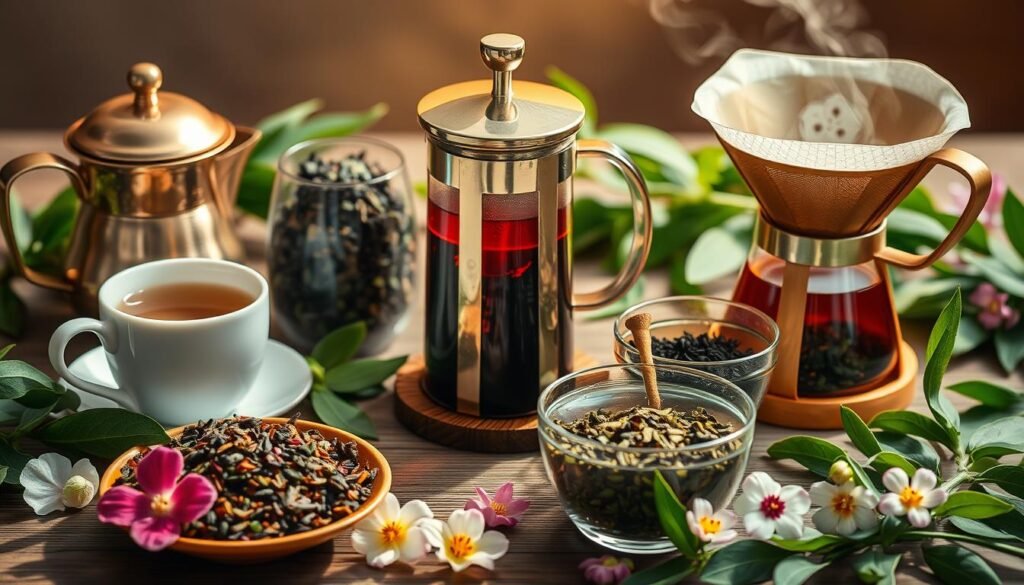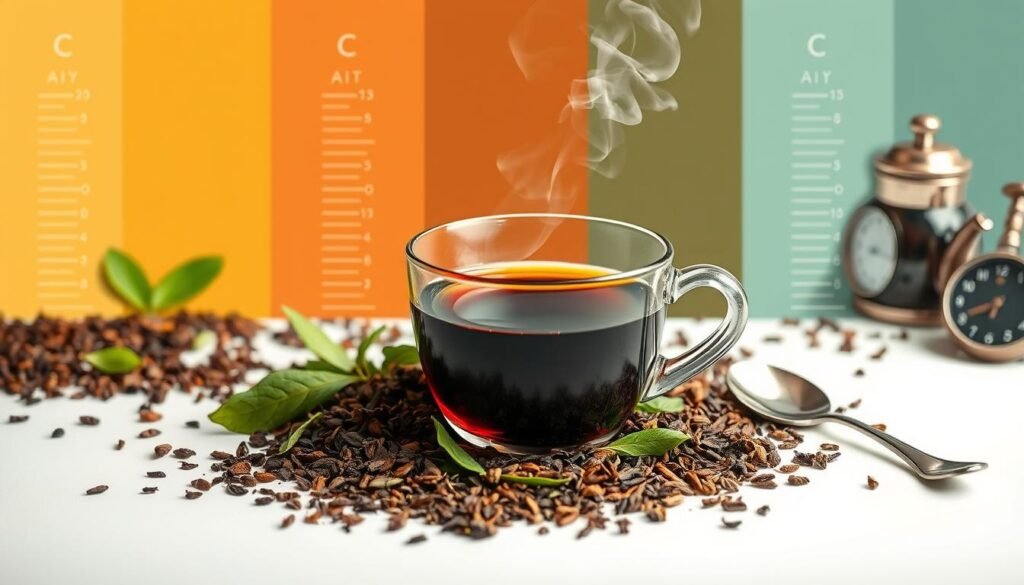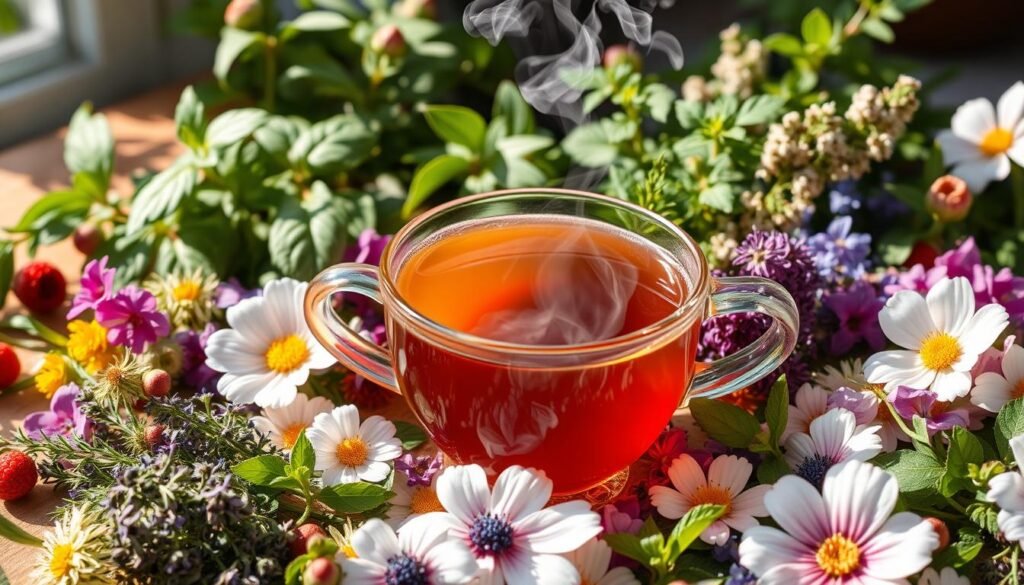Did you know a cup of black tea has about 40mg of caffeine? That’s less than half of the 105mg found in a typical cup of drip coffee. This fact shows why knowing about caffeine in tea is key. Many love tea for its taste and the energy boost. However, caffeine’s effects in tea come with twists due to other substances like L-theanine. This ingredient can change how caffeine influences our focus and alertness.
This guide will reveal the caffeine levels in different teas. It gives details on how to brew tea and the unique traits of each type. Whether you’re just someone who enjoys a cup now and then, or a true tea lover, understanding these caffeine levels can make your tea drinking more enjoyable.
Key Takeaways
- The average caffeine content in black tea is about 40mg per cup.
- Drip coffee typically contains around 105mg of caffeine, significantly higher than most teas.
- Decaffeinated tea has approximately 5-10mg of caffeine, depending on the type.
- Caffeine extraction is most effective in the first 30 seconds of steeping, where 20-30% of it is released.
- Green teas are best enjoyed within four to six months of picking for optimal flavor.
- The shelf life of tea can vary with storage: vacuum-sealed foil bags can last up to a year.
Understanding Caffeine: A Brief Overview
Caffeine is a vital ingredient found in tea and coffee. It adds to the flavor and quality of these drinks. Besides being a stimulant, it enhances the overall taste experience. In tea, caffeine mixes with theobromine and theophylline to create a unique taste.
The effects of caffeine can be both good and bad. It boosts alertness and focus but too much can cause jitteriness. At first, people called it ‘theine’ in tea, but soon discovered it’s the same as caffeine in coffee.
Caffeine content changes based on the tea type and how it’s brewed. For example, black English style tea has about 40mg of caffeine. On the other hand, drip coffee has roughly 105mg. The amount of caffeine in tea and coffee can also change with brewing methods and where the tea leaf is on the plant.
Now, we’re ready to dive deeper into caffeine in both tea and coffee. We’ll look at different teas and their caffeine levels next.
Caffeine Content in Tea: How Much Is Really There?
The caffeine levels in tea can vary a lot. It depends on the tea type and how you brew it. Black tea usually has about 40-60 mg of caffeine per 8-ounce cup. That’s less caffeine than coffee, which often has around 95 mg per cup. The caffeine in tea comes out slowly when you steep it. Actually, within the first 30 seconds, only 20-30% of the caffeine is released.
The kind of tea leaves also affects how much caffeine you get. Tea bags with broken leaves or finely ground tea give a stronger caffeine kick than whole leaf tea. Among teas from the Camellia sinensis plant, black tea has the most caffeine. Oolong tea comes next, with more caffeine than green or white tea but less than black tea. Green tea has about 30-50 mg of caffeine, and white tea about 25-40 mg.
Even “decaffeinated” tea still has a little caffeine, about 5-10 mg per cup. This is good for people wanting to cut down on caffeine but still enjoy a hot drink. For a totally caffeine-free choice, herbal teas like chamomile and rooibos are perfect because they have no caffeine.
| Type of Tea | Approximate Caffeine Content (mg) |
|---|---|
| Black Tea | 40-60 |
| Oolong Tea | 30-50 |
| Green Tea | 30-50 |
| White Tea | 25-40 |
| Decaffeinated Tea | |
| Iced Black Tea | 25-60 |
Knowing how much caffeine is in tea helps people choose wisely. It helps them manage how much caffeine they have each day.
Types of Tea and Their Caffeine Levels
It’s helpful to know how much caffeine is in different teas. This knowledge lets people choose what’s best for them. We’ll look at the caffeine in various teas and see how they differ.
Black Tea Caffeine
Black tea has a lot of caffeine, usually 40-60 mg per cup. Compared to coffee, it has about half the caffeine. It’s perfect for those who want both strong taste and a good caffeine level.
Green Tea Caffeine
Green tea has less caffeine than black tea, with about 30-50 mg per cup. The caffeine varies with the type of leaf and how long it steeps. It’s a milder option for those who still want a caffeine boost.
Oolong Tea Caffeine
Oolong tea’s caffeine is between black and green tea, around 30-50 mg per cup. Its special processing creates a rich taste. It’s a great choice for those looking for balanced caffeine.
White Tea Caffeine
White tea usually has the least caffeine, about 25-40 mg per cup. The specific variety of tea can change this amount. It’s a great choice for a light caffeine touch.
Herbal Tea Caffeine
Herbal teas usually have no caffeine. This makes them great for those avoiding caffeine. You can enjoy these teas anytime without worrying about caffeine.
| Type of Tea | Caffeine Content (mg per 8 oz) |
|---|---|
| Black Tea | 40-60 mg |
| Green Tea | 30-50 mg |
| Oolong Tea | 30-50 mg |
| White Tea | 25-40 mg |
| Herbal Tea | Caffeine-Free |
The Impact of Brewing Methods on Tea Caffeine Levels
Tea lovers should know how brewing methods can change caffeine levels in tea. The temperature of the water and how long you steep the tea are key. They affect how much caffeine comes out of the tea leaves.
Water Temperature
Getting the right water temperature is very important for caffeine. Using hotter water, like 100 degrees Celsius, can give you more caffeine. For example, brewing 5 grams of tea leaves in 100ml of hot water can extract around 67 mg of caffeine. This is way more than using water at 20 degrees Celsius, which only gets you 2.2 mg. So, the temperature you brew your tea at can greatly change the tea caffeine levels.
Steeping Time
The longer you steep your tea, the more caffeine you get. Steeping for five minutes usually means more caffeine than just two minutes. This shows how important steeping time is.
Leaf Size and Tea Bags
The size of the tea leaves matters too. Tea bags, with their small pieces, often make a stronger cup of tea. This leads to higher tea caffeine levels. Smaller leaves mean more surface area touching the water, which helps with caffeine extraction. Knowing these brewing tips can help you manage your tea’s caffeine content better. For more details, visit this informative resource.

Caffeine in Green Tea: Unique Characteristics
Green tea has a special caffeine profile unlike other drinks. An 8-ounce cup has about 29 milligrams of caffeine. This is less than the 47 milligrams in black tea and 95 milligrams in coffee. This lower level of caffeine gives a smoother energy lift. It makes green tea a popular pick for those wanting to stay sharp without coffee’s jittery side effects.
The L-theanine in green tea adds to its charm. This amino acid, only found in tea, leads to a relaxed but focused state. People enjoy how caffeine and L-theanine together improve mental sharpness. This mix helps them do better in their daily tasks.
Green tea is known for more than caffeine. It has lots of benefits of green tea. Research shows its rich in polyphenols, giving it strong antioxidant and anti-inflammation powers. Drinking it regularly can lower your chances of having a stroke or developing type 2 diabetes. It might also protect your brain against diseases like Alzheimer’s.
Choosing to drink green tea regularly is good for your health and enjoyable. Whether you want a tasty drink or to boost your brain power, green tea’s unique features make it a top choice for those who care about their health.
Black Tea Caffeine: A Closer Look
Black tea has high caffeine levels, making it popular among those wanting a boost. An 8-ounce cup holds 40-60 mg of caffeine. The amount varies by tea type, how it’s brewed, and the brand. Knowing this helps tea lovers pick their ideal blend.
The caffeine content in tea is influenced by fascinating factors. Tea bags with broken leaves have more caffeine than loose leaf teas. Also, the first 30 seconds of brewing release 20-30% of the caffeine. This means longer brewing makes your tea stronger.
But black tea is more than just caffeine. It’s loaded with antioxidants, boosting health and well-being. This makes black tea a great combo of energy and health benefits. It’s celebrated worldwide, from morning rituals to afternoon breaks.
Although black tea is great for its caffeine, drinking it late can affect sleep. For those sensitive to caffeine, herbal teas are a good option. They don’t have caffeine.

Decaf Tea: Understanding Its Caffeine Content
Misconceptions of decaf are widespread. Many think decaf tea has zero caffeine. But, it usually has 5 to 10 mg per cup. Although lower than regular tea, it’s not caffeine-free.
The decaffeination process doesn’t remove all caffeine. Studies show just 9% of caffeine leaves in the first 30 seconds of brewing. To cut about half the caffeine, it takes 3 minutes. Removing over 96% needs at least 15 minutes. So, brewing time really matters.
Misconceptions About Decaffeination
Some try to make decaf tea by brewing it for less time. But this method doesn’t work well. It doesn’t lower caffeine much. Plus, it removes good stuff from the tea. Decaf tea, however, lets people enjoy tea’s taste without the caffeine effect.
Looking for mental clarity or calm? Green tea’s L-Theanine might help. You can learn more here.
Herbal Tea Caffeine: Are They Really Caffeine-Free?
Herbal teas offer a refreshing choice for those avoiding caffeine. They are made from a variety of plants, not traditional tea leaves. This makes most of them caffeine-free. Popular caffeine-free teas include chamomile, rooibos, and peppermint, known for their delicious flavors.
However, not all herbal teas are caffeine-free. For example, yerba mate and certain citrus flower teas have caffeine. When selecting herbal teas, it’s important to check the ingredients. Most are labeled as “herbal tisanes,” consisting of botanicals without caffeine.
For those seeking relaxation, herbal teas are a great option. Blends like Wild Berry Hibiscus and Chamomile Citron are ideal for avoiding caffeine. In summary, here are the key points:
- Most herbal teas are caffeine-free.
- Some, like yerba mate and guarana, contain caffeine.
- Herbal tisanes offer various flavors and aromas.

Incorporating herbal tea into your day can be easy and pleasant. But, it’s vital to know if specific blends contain caffeine. Overall, the world of herbal teas provides many tasty and caffeine-free choices. They meet different tastes and dietary needs.
| Herbal Tea Type | Caffeine Content |
|---|---|
| Chamomile | Caffeine-Free |
| Rooibos | Caffeine-Free |
| Peppermint | Caffeine-Free |
| Yerba Mate | Contains Caffeine |
| Guarana | Contains Caffeine |
| Wild Berry Hibiscus | Caffeine-Free |
Comparing Tea versus Coffee Caffeine Levels
It’s important to know the caffeine difference in tea and coffee. When talking about tea versus coffee caffeine, coffee has more caffeine. A cup of coffee can have between 95 and 200 milligrams of caffeine. This is a lot more than what’s in tea.
The Average Caffeine Content in Coffee
Typical drip coffee has around 105 milligrams of caffeine. Brewing methods like espresso may have more because of how it’s made. Factors like the coffee bean type and processing affect the coffee caffeine levels. For example, Robusta beans have about twice the caffeine of Arabica beans.
How Processing Affects Caffeine Distribution
Tea leaf processing changes caffeine content too. How tea leaves are harvested, dried, and oxidized matters a lot. Black teas have between 14 and 70 milligrams of caffeine. Green teas usually have between 24 and 45 milligrams. Some teas like Gyokuro or Assam offer more caffeine but still less than coffee.
Here’s a table that shows caffeine in different drinks:
| Beverage | Caffeine Content (mg per cup) |
|---|---|
| Drip Coffee | 105 |
| Black Tea | 40 |
| Green Tea | 30 |
| White Tea | 30 |
| Caffeinated Soda | 35 |
| Decaffeinated Tea | 5-10 |
| Herbal Infusion | 0 |
If you’re watching your caffeine, the Mayo Clinic suggests no more than 500 milligrams a day. Knowing about different sources of caffeine helps you choose wisely for good health.
Conclusion
Exploring the caffeine in tea shows different levels in various types. Black tea has high caffeine, while white and herbal teas have less. This helps tea lovers pick what’s best for them. The way tea is brewed, like using hot water or steeping longer, also affects caffeine levels.
Tea and coffee have different caffeine amounts, with tea ranging from about 40 to 120 mg per serving. This comparison helps people choose based on their caffeine sensitivity. Storing tea right keeps it fresh and tasty for every cup.
Enjoying tea the right way means enjoying its flavors and benefits while knowing your caffeine limits. With the right knowledge and approach, tea enthusiasts can enjoy their brews to the fullest. It’s about balancing pleasure with understanding caffeine’s effect on health.